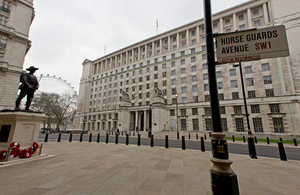New directors appointed to the Animal Health and Welfare Board for England
News story
Biosecurity Minister Lord Benyon has appointed six new members to the Animal Health and Welfare Board for England

Biosecurity Minister Lord Benyon has appointed six non-executive directors to the Animal Health and Welfare Board for England (AHWBE).
The appointments of Peter Laurie, Emma Slawinski, Gwyn Jones, James Russell, John Reed and Charles Sercombe will take effect from 1 November 2021 for 3 years and will support the new Chair Jonathan Statham.
All appointments to AHWBE are made on merit and political activity plays no part in the selection process. The appointments comply with the Ministerial Governance Code on Public Appointments.
Commenting on the appointments, Biosecurity Minister Lord Benyon said:
These appointments will bring a wealth of farming, veterinary and animal welfare experience to the vital work of the Animal Health and Welfare Board for England.
The UK is a world leader in animal health, welfare and biosecurity and I look forward to working closely with the Board to further build our knowledge, research and resilience in this important area.
Biographies:
Peter Laurie
- Peter has been Chief Executive Officer of Battersea Dogs and Cats Home since January 2021.
- He has worked at the organisation since 2015 and has years of experience of working in the companion animal and regulated animals in sport sectors.
- He was the Chief Executive of the Greyhound Trust until 2015 and the Deputy Director of Regulation for the Greyhound Board of Great Britain until 2011. He is still on the Greyhound Board of Great Britain UKAS Impartiality Committee that is involved in the inspection and licensing of greyhound racecourses.
- He is a Trustee of Petplan Charitable Trust which funds advances in veterinary science and animal health and a founding Trustee at the Southern Thailand Elephant Foundation.
Emma Slawinski
- Emma is the Director of Advocacy and Policy at the RSPCA and previously Global Director of Campaigns and Communications at Compassion in World Farming, during which time the organisation won the 2020 Charity Film of the year, and was awarded 2nd place (as part of a coalition) in the European Commission’s EU Health Award for reducing the threat to human health from antimicrobial resistance.
- She has also been a Director at World Animal Protection, running campaigns on wildlife tourism and working with the Serbian and Romanian Governments on dog population management.
Gwyn Jones
- Gwyn is a current non-executive director of the AHWBE. He has farmed in Sussex for many years but originally comes from a hill farming family in Snowdonia, North Wales.
- He spent 35 years as a dairy farmer and bring a wealth of experience in that profession.
- He has a long history with the NFU including local and National Board positions such as Vice President.
- He has also been the Chairman of other groups including the AHDB Dairy Board, RUMA (Responsible Use of Medicines in Animals) and the European platform EPRUMA .
James Russell
- James is an independent veterinary consultant and an officer of the British Veterinary Association (BVA).
- His role at the BVA has allowed him to take positions as a member of the RUMA group and the Animal Health and Welfare Pathway Veterinary Group, Ruminant Health and Welfare Group and both Defra’s TB Partnership Group and the Welsh Government’s TB EPI Group.
- He is also a SEMEX named veterinary surgeon where he is able to support farmer training.
John Reed
- John is a small livestock farmer and a non-executive director of Avara Foods.
- He brings extensive experience of agriculture to the Board and has been involved with the Red Tractor Assurance Scheme for the last 20 years.
- He has been involved in numerous industry and government committees, initiatives and reports on poultry and animal health and welfare including the Radcliffe Cost and responsibility review and several Farm Animal Welfare Committee (FAWC) reviews.
- He has been involved with and represented the poultry meat industry for many years, including an 8 year term as Chairman of the British Poultry Council.
- He is the co-founder and former chairman of the Poultry Health and Welfare Board and a member of the Rare Breeds Survival Trust.
Charles Sercombe
- Charles is a first-generation sheep farmer involved in a wide variety of work in agriculture.
- He has significant experience of chairing and contributing to a diverse range of boards and committees including Defra’s Animal Health and Welfare Pathway Steering Group; the Sheep breeders Round table; Sheep Health & Welfare Group and the Ruminant Health and Welfare Group.
- He is also an independent farmer member on the NOAH Complaints Committee.
- He has also been the Chair and member of several NFU Boards, including the Livestock Board and a member of the NFU National Policy Board and Governance Board.
About the Animal Health and Welfare Board for England:
- Launched in 2011, the Animal Health and Welfare Board for England (AHWBE) is the principal source of advice to Defra ministers on all strategic health and welfare matters relating to kept animals in England.
- Its responsibilities include animal health and welfare policy, assessing the threat from animal diseases, and reviewing contingency plans for disease outbreaks.
- More information about the board is available on GOV.UK.
Published 29 October 2021
